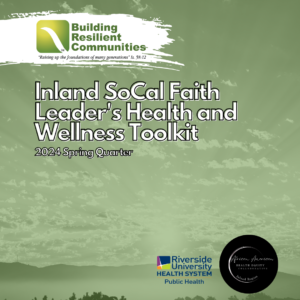COVID-19 RESOURCES
Did you know that COVID-19 can feel like a common cold or seasonal allergies? If you’re experiencing any COVID-19 symptoms (which include runny nose, cough, sore throat, fever, body aches and more) please get tested for COVID-19.
Visit www.cdph.ca.gov for more information on how you can get tested!
Building Resilient Communities is Partnering with NAACP Riverside Branch
Greetings Pastors,
We are so excited to share the new tool kit to help Pastors discuss Covid-19. This toolkit was created as a resource for churches in the Black Community. We created the kit as a repository for Covid-19 information and advisory updates about Covid-19.
The agencies that created this toolkit believe and stand on the premise that we Walk by Faith and Not by Sight. The toolkit is a compilation of statistics and personal testimonies that will hopefully be able to springboard your messages as we continually navigate the pandemic.
It is our plan to update the toolkit on a regular basis and provide you with access to those revised kits. In the next phase, we hope to compile interviews of Pastors sharing how they and their congregations have navigated this pandemic. We will continue to update the info graphics given to us by the county health departments and COVID-19 local and national experts.
We are very thankful for the partnership we have with the Riverside University Health System – Public Health Equity team, the African American Vaccine Equity Collaborative, and our local Pastors.
The Riverside Branch of the NAACP continues to prioritize promoting vaccinations, testing, and COVID safety precautions.
Thank you for continuing to partner with us as we WALK BY FAITH TOGETHER.
Dr. Regina Patton Stell
NAACP Riverside Branch
Download the Pastor’s Toolkit Today!
COVID-19
You might be asking, is the COVID pandemic over? Unfortunately, COVID-19 is still a serious threat to our communities. Death and hospitalizations, though lower than what we saw early on in the pandemic, are still higher than a normal virus, with 300 people dying and 3,000 new hospital admissions every day in the U.S. In addition, the number of deaths of pregnant people increased during the pandemic as a result of COVID-19, with COVID-19 causing 1 out of every 4 deaths among pregnant people. Make sure you stay up-to-date with your vaccinations and boosters!
*The following is for informational purposes only and should not be used in place of medical advice. If you are experiencing COVID-19 symptoms, please contact your healthcare provider or find a testing site near you.
COVID-19 Vaccine
Vaccines save lives. COVID-19 vaccines offer protection against serious illness, hospitalization and death. There is also evidence that suggests that vaccination makes individuals less likely to pass on the virus to others. COVID-19 vaccines are safe and effective for everyone aged 6 months and older.
Boosters
As protection from the original COVID vaccination decreases over time, a booster shot is administered to provide additional protection. The CDC recommends individuals receive a booster in order to maintain protection against severe COVID symptoms.
Visit the California Department of Health to learn more about COVID-19 vaccines and boosters.
Lower Risk
Individuals who are young and healthy and test positive for COVID-19 can manage their symptoms using over-the-counter treatments such as:
- Nasal sprays
- Cough/throat drops
- Decongestants
- Pain and fever medication (e.g., Tylenol, Advil)
Higher Risk
For older individuals or those with underlying medical conditions such as asthma, diabetes, and obesity, who have tested positive for COVID-19, treatment options may include:
- Prescription oral antiviral treatment (within 5 days)
- Monoclonal antibody treatment (within 10 days)
- Remdesivir (within 7 days)
Highest Risk
Individuals who do not currently have COVID-19, but have a weakened immune system due to conditions such as cancer, an organ transplant, or use of medications that suppress the immune system, may be eligible for EVUSHELD Monoclonal Antibody treatment.
Evusheld is a combination of two medications given together: tixagevimab and cilgavimab that act like antibodies made by the immune system to fight an infection. Evusheld is administered by two injections immediately given one after another. Based on clinical trial data, Evusheld is administered every six months to offer the most protection. It is an investigational medicine that has been authorized by the U.S. Food and Drug Administration as a pre-exposure prophylaxis only for the duration of the COVID-19 pandemic.
Treatment options for high-risk individuals who test positive for COVID-19 may include:
- Prescription oral antiviral treatment (within 5 days)
- Monoclonal antibody treatment (within 10 days)
- Remdesivir (within 7 days)
Join our mailing list for important updates and information.




